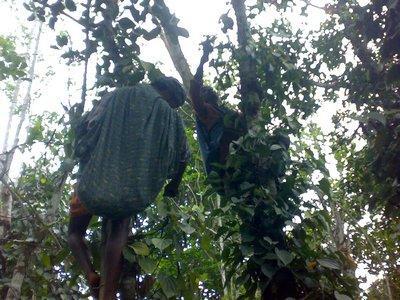Jennu kurumbas were originally hunters and gatherers. One of the major occupations of JKs has been honey-tapping. They are experts in collecting wild honey. They tap different kinds of honey (t̪uɖe, t̪uppɐ, d͡ʒeːnɨ, seɾɨ d͡ʒeːnɨ.... etc). They gather other forest products also like tree moss, variety of tubers, medicinal leaves and plants, etc.
JKs also do lot of hunting. Some of the wild animals and birds they hunt are ‘uɖu,’ ‘kuːɾɐnɨ,’ ‘hɐɾɐnɨ,’ ‘sɐɾeɡɐnɨ,’ ‘kɜɖɜʋe,’ ‘bekkɨ,’ ‘punuhu,’ ‘kɐʈʈɐɖɨ,’ kiːɾɐnɨ,’ ‘kɐɖɨ koːɭi,’ ‘mɐɖe hɜkki,’ kuɡɡilɨ hɜkki,’ ‘unɨɡɨ hɜkki,’ ‘kuʈɾe hɜkki,’ ‘soɾɨʈʈɐ hɜkki,’ ‘koʈʈɐɭe hɜkki,’ ‘sɨʈʈɨ hɜkki,’ etc. Makhan Jha says “So far the consumption is concerned the tribal economy reveals the nature of democratic system at the family level.” [1] This is true with JKs. The honey, tubers and the meat are shared with their family members equally.
Those who live inside the forest own their small land and cultivate it. Others who live in the outskirts of the forest work as laborers to the owners of the land nearby. Tea, Coffee, pepper and betel nut are the major cultivation they are involved in. Other than these four, they have other cultivation also – rice, cotton, ragi, horse gram, beans, chilly, ginger, dhal, maize etc. Coffee and Tea are grown only in hilly areas of all the three states – Karnataka, Kerala and Tamil Nadu.
JKs sell all the products they collect to the people from other communities – for eg. Gowdas, Sholigas, Chettys, etc. These people in turn will sell them in the market. Also they sell their products to the ‘Government Society’ found in big towns. Sometimes they sell their products especially the animals and birds in the black market.
Besides gathering and hunting, JKs are employed by Forest department as mahouts and watchers. During summer season the forest is prone to forest fire. So the Government appoints them as watchers temporarily in order to protect the forest from forest fire.
DISTRIBUTION
Honey is one of the main products they sell. One litre of honey fetches between Rs. 100 if given to ‘Government Society’ and more than Rs. 250 if sold in the black market. They collect different kinds of roots and sell. Some – (i)‘ɐle beːɾɨ’ – Rs. 200, (ii) ‘kɜjjɜmbeːɾɨ’ – Rs. 300, (iii) ‘bɜʈlɜmbu beːɾɨ’ – Rs. 300, (iv) ‘suɳɖeː beːɾɨ’ and (v) ‘kurun̪d̪ɜʈʈi beːɾɨ.’ These roots are used for medicinal purpose (ayurvedic).
Certain cultivation is seasonal. Cotton is normally planted in the month of March. It takes 6 months to grow. It gives yield for one to one and a half months. Then it has to be destroyed. One acre of land can yield around one quintal (100 kg). Sometimes it can go up to 6 to 7 quintals. One quintal fetches between Rs. 2500 to Rs. 3000. Similarly Ragi is also cultivated. One quintal of ragi fetches between Rs. 1000 to Rs. 1500. After ragi is harvested the remaining grass is used as cattle fodder.
Bamboo rice is another product that is collected by Jennu kurumbas. This rice is to be gathered around the tree. Every tree dies after giving rice once. One kilogram of bamboo rice is sold for about Rs. 150. Tree moss fetches between Rs. 60 and Rs. 100 per kg.
EXPLOITATION OF Jennu kurumbas
Jennu kurumbas are very passive. They have a kind of fear over the outsiders. Even if others scold them they don’t talk back or retaliate. This has made them more vulnerable to exploitation by non-tribals esp. the land owners. Most of the time they are not rightly paid for what they work. In some places (especially in Kodagu dist of Karnataka), they are kept by land owners as slaves.
Because of their passive nature, they do not claim the rights. Government has so many policies in order to benefit them. But they do not normally make use of them due to fear of going to the Government offices.
CONCLUSION
Jennu kurumbas in their earlier days enjoyed their life being in the forest. They had everything in the forest to survive. But the Government tried to resettle them in the colonies so that they may grow economically. The real struggle started after their resettlement. They still struggle and long to go back to the forest – the place where they belong to.
To know more about JK's economic system through PowerPoint presentation please click here
BIBLIOGRAPHY
Hiebert, Paul G. Cultural Anthropology. Philadelphia: J. B. Lippincott Company, 1976.
Jha, Makhan. An Introduction to Social Anthropology. New Delhi: Vikas Publishing House Pvt Ltd., 2001.
[1] Makhan Jha, An Introduction to Social Anthropology (New Delhi: Vikas Publishing House Pvt Ltd, 2001), p. 125.
